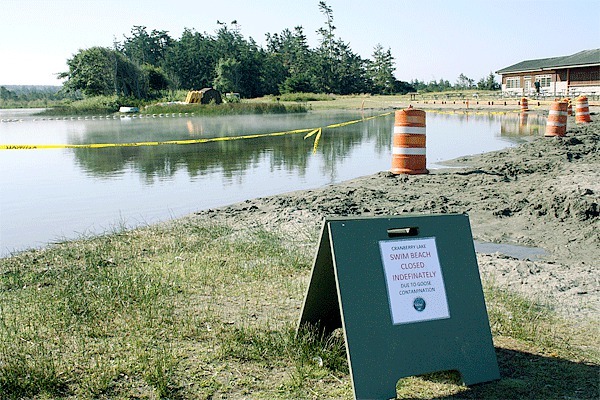A group of Canada geese caused the closure of a popular swimming hole on North Whidbey Island.
Island County Public Health announced this week that the western part of Cranberry Lake, located on the Whidbey Island side of Deception Pass State Park, is closed to swimming until further notice.
Health officials closed the popular swim site because of persistently high levels of E. coli bacteria that has been recorded in that part of the lake, according to the Island County Public Health.
Red advisory signs and caution tape are posted at the swimming area to discourage swimmers from taking a dip.
“We don’t want people to risk even going in there,” said Jack Hartt, manager of Deception Pass State Park.
It appears that a high population of Canada geese, commonly referred to as Canada honkers, is the cause of the elevated E. coli levels.
Deception Pass Manager Jack Hartt said the population of the honkers has increased in recent years. He estimated that between 50 and 80 geese currently live at Cranberry Lake. The droppings the geese produce has been a problem for park staff since each bird produces between one and three pounds of doo each day. He said staff cleans the manure from the beaches, but they don’t have any way to remove it from the water.
Big piles of the poop remained at the edge of the deserted swimming hole Friday morning.
The Island County Health Department is advising people to avoid swimming, wading or water play where water could be swallowed, get into the mouth nose or eyes.
Contact with fecal contaminated bacteria can result in gastroenteritis, skin rashes, upper respiratory infections and other illnesses. The risk is greatest for young children, the elderly or anyone with a compromised immune system.
Jill Wood, Island County environmental health director, said Friday morning staff monitors area swimming areas in the county on a monthly basis during the summer months. When staff noted the high concentrations of E. coli when they took a sample at Cranberry Lake Tuesday, they notified park staff of the situation and took a second sample to confirm the results. After the confirmation test, the closure was announced.
Thursday’s announcement marks the first time health officials have closed a freshwater swimming area in Island County because of E. coli, Wood said.
“We hope we can get a solution as quickly as possible,” Wood said. She complimented the efforts of park staff to proactively manage the closure.
Health officials will monitor the bacteria levels at Cranberry Lake on a weekly basis.
The closure of the west side of Cranberry Lake to swimming comes during the busiest time of the year at one of the busiest state parks in Washington. That swimming area is a popular attraction for campers and visitors. Only a narrow sandy beach separates it from the chilly waters of Puget Sound.
“It’s going to be a real frustration to people coming up here expecting to find a swimming beach and not finding one,” Hartt said.
The closure will affect the park system’s revenues and it will also affect the concession stand that operates near the swimming area, Hartt said.
He noted that the lake is still open to boats and fishing.
As for finding a solution to the bacteria problem, that could prove to be difficult.
Hartt said staff is looking at options, but doesn’t have a solution yet. One option would be to make loud noise to scatter the geese, but that would disturb visitors.
Gary Piazzon, member of the Whidbey Audubon Society, said the best way to eliminate a goose problem is to get rid of lawns, which are a favorite spot for the honkers because it gives them great visibility to spot potential predators.
Cranberry Lake isn’t the only place on Whidbey Island that has had a goose issue.
Plans were in place at Honeymoon Lake last spring to euthanize four adult geese and three goslings. That incident angered local bird enthusiasts and prompted a petition drive to try and save the geese. Eventually someone snuck into the area and removed the geese.
Piazzon recommends against forcible relocation. Interacting with the geese could be dangerous and they also may have health problems that could threaten other geese populations.
As for the water quality, Hartt said there isn’t much that can be done right now. The lake does drain toward the south, but the water level is currently low and it won’t drain quickly.
He’s concerned the swimming closure on the west side of Cranberry Lake will remain in effect through the summer. Hartt pointed out that the east side of Cranberry Lake can be used for swimming; however, it is also a popular fishing spot and it would take some cooperation for both activities. The east side of the lake doesn’t have a designated swimming area; it just has a pier which is popular with local anglers.



